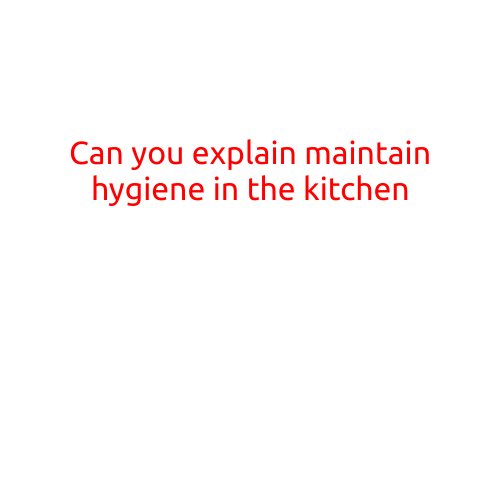
Can You Explain Maintain Hygiene in the Kitchen?
Maintaining hygiene in the kitchen is crucial for ensuring the safety and well-being of yourself, your family, and your guests. A clean and hygienic kitchen can help prevent the spread of illnesses, reduce the risk of food poisoning, and create a comfortable and enjoyable cooking environment.
In this article, we will explore the importance of maintaining hygiene in the kitchen, provide tips on how to do it effectively, and highlight some common mistakes to avoid.
Why is Kitchen Hygiene Important?
Kitchen hygiene is important for several reasons:
- Food Safety: A dirty kitchen can lead to cross-contamination of food, which can result in foodborne illnesses. Bacteria, viruses, and parasites can be lurking on surfaces, utensils, and cookware, waiting to contaminate your food.
- Prevention of Illness: According to the Centers for Disease Control and Prevention (CDC), more than 48 million people in the United States suffer from foodborne illnesses each year. Maintaining hygiene in the kitchen can help prevent these illnesses and reduce the risk of disease transmission.
- Comfort and Enjoyment: A clean and hygienic kitchen creates a comfortable and enjoyable cooking environment. It can also boost your confidence in preparing and storing food.
How to Maintain Hygiene in the Kitchen
Maintaining hygiene in the kitchen requires attention to detail and consistency. Here are some tips to help you achieve a clean and hygienic kitchen:
- Clean as You Go: Clean up as you go to prevent crumbs, spills, and messes from accumulating. This habit can save you time and effort in the long run.
- Wash Your Hands: Wash your hands frequently with soap and warm water, especially after handling raw meat, poultry, or fish. Use a hand sanitizer if soap and water are not available.
- Clean Surfaces: Regularly clean and disinfect surfaces, including countertops, sinks, faucets, and appliances. Use a mild detergent and warm water, and rinse thoroughly.
- Clean Utensils and Cookware: Wash and sanitize utensils and cookware after each use. Use a gentle cleanser and avoid using abrasive materials that can scratch surfaces.
- Store Food Properly: Store food in airtight containers and keep them away from raw meat, poultry, and fish. Use airtight bags or containers to prevent cross-contamination.
- Clean Trash Cans: Empty trash cans regularly and wash them with soap and warm water to prevent odors and pests.
- Maintain Your Fridge: Regularly clean and defrost your fridge to prevent bacterial growth and food spoilage.
- Use a Dishwasher: If you have a dishwasher, use it regularly to clean and sanitize dishes, glassware, and utensils.
- Label and Organize: Label and organize your kitchen tools, utensils, and storage containers to prevent confusion and ensure everything has a designated place.
- Schedule Regular Deep Cleans: Schedule regular deep cleans to tackle tough messes and areas that require extra attention.
Common Mistakes to Avoid
While maintaining hygiene in the kitchen is essential, there are some common mistakes to avoid:
- Not Cleaning Up Immediately: Delaying cleaning up can lead to the spread of bacteria and the accumulation of messes.
- Not Washing Your Hands: Failing to wash your hands can lead to the transmission of illnesses and infections.
- Using the Same Utensils for Raw Meat and Ready-to-Eat Foods: This can lead to cross-contamination and food poisoning.
- Not Cleaning and Disinfecting Surfaces: Failure to clean and disinfect surfaces can lead to the spread of bacteria and viruses.
- Not Storing Food Properly: Failing to store food properly can lead to spoilage, contamination, and foodborne illnesses.
Conclusion
Maintaining hygiene in the kitchen is crucial for ensuring the safety and well-being of yourself, your family, and your guests. By following these tips and avoiding common mistakes, you can create a clean and hygienic kitchen that promotes comfort, enjoyment, and food safety. Remember, a clean kitchen is not only essential for your health but also a reflection of your attention to detail and dedication to producing delicious and safe meals.





